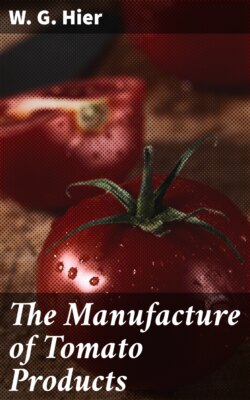Читать книгу The Manufacture of Tomato Products - W. G. Hier - Страница 9
На сайте Литреса книга снята с продажи.
Methods in East and West
ОглавлениеIn the Tri-States—that is, Delaware, Maryland, and New Jersey—quite a different situation exists from that in the middle west or far west. The western packer has practically all of his tomatoes grown under contract, while the Tri-State packer, although he tries to contract as much acreage or tonnage as possible at a reasonable figure, is up against the competitive buying of the open market for a large proportion of his raw stock, as there are always a large number of farmers who are willing to gamble that the coming season will be a good one for playing the open market. In this case the buyer usually cannot be as particular about the quality of the tomatoes he buys as can the packer who has his tomatoes all grown under contract at a specified price, and who can exercise supervision over his farmers. This is particularly true in seasons of short crop, when the grower sells his tomatoes on the market and can afford to be very independent, and buyers are wildly forcing up the price by competitive bidding, and taking whatever they can get. Even if the eastern grower is under contract for his entire crop, if the crop is short, and high prices are prevailing on the market, it is the exceptional grower who will live up to his contract, and often to get an excuse for breaking his contract he will deliver very poor tomatoes right along in the hope that they will be objected to, thus giving him the liberty of disposing of them elsewhere.
The eastern packer, however, is blessed with a longer season in which to operate. While in the west there are seldom enough tomatoes to justify a run at the factory before August 15th, the Tri-States packer starts in on the early crop about the 25th of July, and his crop is not as liable to be severely injured by an early frost as is the western crop.
Canning and preserving plants in the west, being scattered rather sparsely over a very large territory, and being farther away from the large centers of population than in the east, the western packer is able to get a large percentage of his tomatoes hauled to the factory by wagon. This is indeed a big advantage, not only in the saving of freight and handling expense, but in the condition of the fruit when delivered to the factory. Probably having been picked not more than twenty-four hours before delivery, the wagon-hauled tomatoes are solid, and because the skin is not broken by repeated handling, thus preventing the growth of molds, they require very little sorting, in fact, no sorting at all in some cases. A load of tomatoes which requires no sorting at all, however, is unusual. If the packer can get his growers to use spring wagons for hauling tomatoes, it is a big advantage, especially if the fruit must be held any length of time at the factory. If the wagon-hauled tomatoes can be worked up quickly the packer gets 100 per cent value for them, which he very seldom does get on shipped tomatoes, which commonly undergo a loss of between 5 and 20 per cent in shipment, depending upon the time involved in shipment, the ripeness of the fruit, the amount of handling it received, the condition of the weather, the kind of crate in which the fruit is packed, and the amount of ventilation it received in transit.
